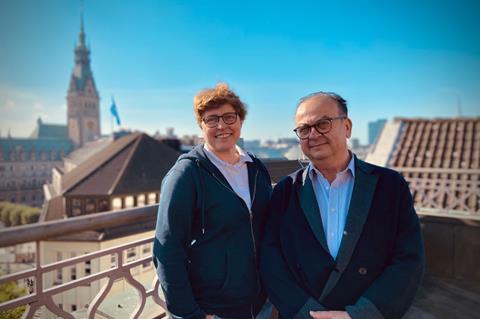
The 30th edition of Filmfest Hamburg opens on September 29. With the world premiere of Hans-Christian Schmid’s We Are Next Of Kin, and will close on October 8 with Maryam Touzani’s The Blue Caftan. There are more than 22 world premieres in this year’s programme, including Fatih Akin’s anticipated gangster rapper biopic Rheingold.
Industry Days from October 4-6 is addressing issues including the pros and cons of tax credits and streaming services being required to invest in local production and the situation of female filmmakers in the Islamic world. It will close with the third edition of the Explorer Conference on October 7.
Festival director Albert Wiederspiel and director of programming Kathrin Kohlstedde talk to Screen about this year’s programme, what they are doing to attract younger audiences and how they have decided to handle the Ulrich Seidl controversy.
How would you both describe this year’s line-up?
Kathrin Kohlstedde: What stands out are the number of genre films which are breaking borders and discovering new forms of cinematic language. They include Léa Mysius’ transcendental drama The Five Devils and the Australian film Blaze by Del Kathryn Barton, which is a mix of live action with animation and puppetry, and Simon Rieth’s coming of age drama Summer Scars hovering between realism and fantasy.
Albert Wiederspiel: And then there’s the Algerian film The Last Queen, a historical epic set in pre-colonial times, where the battle scenes are verging on splatter!
KK: As well as the German world premieres we will also be the first festival to show White Dog by the Canadian director Anais Barbeau-Lavalette, which is based on the novel by Romain Gary set in the US in 1968, beset by racial violence when the author takes in a stray dog that is docile to everyone except Black people. It takes a different approach to the subject matter than the one Sam Fuller followed when he made his film version [40 years ago in 1982] and combines the past and present in a very intelligent way.
What is happening to celebrate the Filmfest’s 30th anniversary?
AW: We took part in Hamburg’s open-air screenings throughout the summer with the best of 30 years of the Filmfest and the audiences were able to vote for their favourite.
KK: Billy Elliott, Mustang,Little Miss Sunshine and In The Mood For Love were voted as the most popular films which shows how sophisticated the Hamburg cinemagoers are.
AW: We are offering a special discounted pass of only €30 for everyone under the age of 31 to see films in the programme over four days between September 30 and October 3. It’s a way of attracting the younger audiences because we have to think of the future for the festival and cinemas in general.
And there will be a “festival within a festival”…
AW: Yes, this year will see us hosting Kyiv’s Molodist Film Festival which will present its national competition for Ukrainian feature films and shorts during the Filmfest from September 30 to October 5.
I have known Molodist’s festival director Andriy Khalpakchi for many years and when we met in Cannes this year, the idea to host the festival was spontaneously born. It’s a sign of solidarity between film festivals.
You were originally planning to present Ulrich Seidl with this year’s Douglas Sirk Award at the German premiere of his latest film Sparta until ‘Der Spiegel’’s allegations of child exploitation during its production.
AW: Our programme brochure was already in print when the Spiegel article appeared, but we then decided not to present the award because the whole debate would have overshadowed the award ceremony. At the same time, there wasn’t any reason why we shouldn’t show the film because Seidl has succeeded in making an extremely sensitive film about such a taboo subject. Whatever happens in the film, it is all happening in your head.
As you celebrate the Filmfest at 30, how do you see the festival developing in the future?
AW: I’m pretty confident that whatever crisis the cinema and cinemas are going through, film festivals seem to be pretty resistant. I am very optimistic given that people appreciate curated programming and the opportunity to talk with the director after a film’s screening. We have that advantage over the day-to-day cinemas, but we have to attract younger audiences and get them back on track and unglue them from the couch at home.
How does this edition of Filmfest Hamburg differ from the last two pandemic-era editions?
AW: It looks as if we are returning to normal times because people don’t have to wear masks in the cinemas anymore and we can now have an almost 100% seating capacity. There will also be some screenings with spacing to accommodate those who are still unsure in the third year of the pandemic.
The last two years were mostly about “film” and very little about “fest”, but the second part of our name will now be back since film festivals are also places where you should be able to talk about and celebrate the films after their screenings.















![[L-R]: Amanda Villavieja, Laia Casanovas, Yasmina Praderas](https://d1nslcd7m2225b.cloudfront.net/Pictures/274x183/6/4/1/1471641_pxl_20251224_103354743_618426_crop.jpg)








![[L-R]: Amanda Villavieja, Laia Casanovas, Yasmina Praderas](https://d1nslcd7m2225b.cloudfront.net/Pictures/100x67/6/4/1/1471641_pxl_20251224_103354743_618426_crop.jpg)
No comments yet